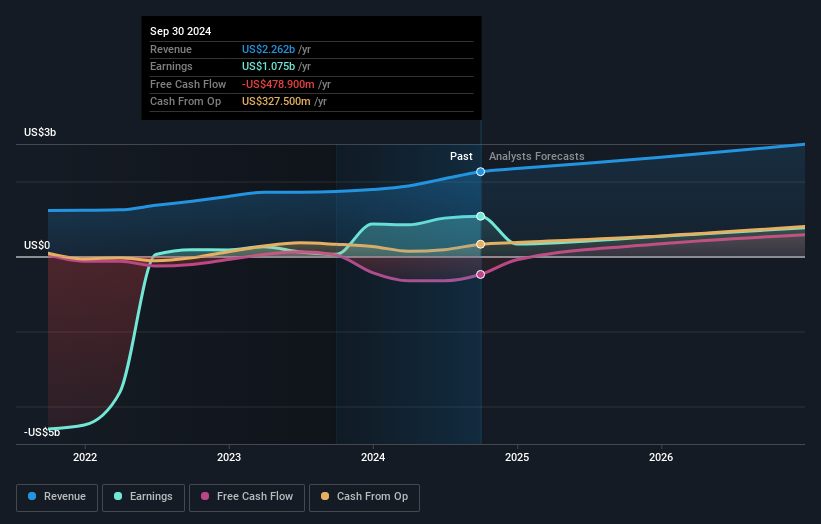Valaris Limited Just Missed EPS By 15%: Here's What Analysts Think Will Happen Next
Valaris Ltd. VAL | 40.82 | -0.78% |
Last week, you might have seen that Valaris Limited (NYSE:VAL) released its quarterly result to the market. The early response was not positive, with shares down 4.8% to US$48.43 in the past week. Statutory earnings per share of US$0.88 unfortunately missed expectations by 15%, although it was encouraging to see revenues of US$643m exceed expectations by 3.7%. Earnings are an important time for investors, as they can track a company's performance, look at what the analysts are forecasting for next year, and see if there's been a change in sentiment towards the company. So we collected the latest post-earnings statutory consensus estimates to see what could be in store for next year.

Following the latest results, Valaris' ten analysts are now forecasting revenues of US$2.64b in 2025. This would be a decent 17% improvement in revenue compared to the last 12 months. Statutory earnings per share are forecast to tumble 46% to US$7.99 in the same period. In the lead-up to this report, the analysts had been modelling revenues of US$2.67b and earnings per share (EPS) of US$8.22 in 2025. So it looks like there's been a small decline in overall sentiment after the recent results - there's been no major change to revenue estimates, but the analysts did make a minor downgrade to their earnings per share forecasts.
The average price target fell 5.9% to US$83.20, with reduced earnings forecasts clearly tied to a lower valuation estimate. It could also be instructive to look at the range of analyst estimates, to evaluate how different the outlier opinions are from the mean. The most optimistic Valaris analyst has a price target of US$100.00 per share, while the most pessimistic values it at US$61.00. Analysts definitely have varying views on the business, but the spread of estimates is not wide enough in our view to suggest that extreme outcomes could await Valaris shareholders.
Taking a look at the bigger picture now, one of the ways we can understand these forecasts is to see how they compare to both past performance and industry growth estimates. It's clear from the latest estimates that Valaris' rate of growth is expected to accelerate meaningfully, with the forecast 13% annualised revenue growth to the end of 2025 noticeably faster than its historical growth of 2.0% p.a. over the past five years. By contrast, our data suggests that other companies (with analyst coverage) in a similar industry are forecast to grow their revenue at 5.5% per year. It seems obvious that, while the growth outlook is brighter than the recent past, the analysts also expect Valaris to grow faster than the wider industry.
The Bottom Line
The biggest concern is that the analysts reduced their earnings per share estimates, suggesting business headwinds could lay ahead for Valaris. Fortunately, they also reconfirmed their revenue numbers, suggesting that it's tracking in line with expectations. Additionally, our data suggests that revenue is expected to grow faster than the wider industry. The consensus price target fell measurably, with the analysts seemingly not reassured by the latest results, leading to a lower estimate of Valaris' future valuation.
With that in mind, we wouldn't be too quick to come to a conclusion on Valaris. Long-term earnings power is much more important than next year's profits. We have estimates - from multiple Valaris analysts - going out to 2026, and you can see them free on our platform here.
This article by Simply Wall St is general in nature. We provide commentary based on historical data and analyst forecasts only using an unbiased methodology and our articles are not intended to be financial advice. It does not constitute a recommendation to buy or sell any stock, and does not take account of your objectives, or your financial situation. We aim to bring you long-term focused analysis driven by fundamental data. Note that our analysis may not factor in the latest price-sensitive company announcements or qualitative material. Simply Wall St has no position in any stocks mentioned.




